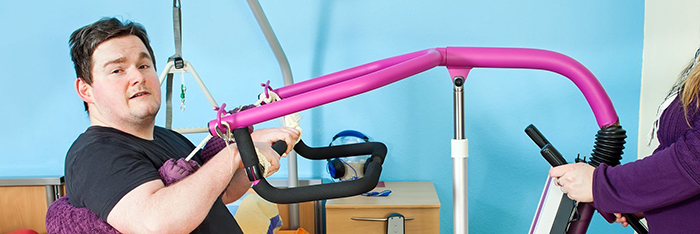Top ranked cerebral palsy claims lawyers

A difficult and detailed, but vitally important, part of our role is to predict and value the needs of an infant with cerebral palsy into adulthood and throughout their life. Like any child, their needs will change as they grow and develop, but for someone with cerebral palsy the transition from childhood to adulthood and independent living brings additional challenges which can seem insurmountable without additional funding and support.
The compensation that we secure for our clients allows this support to be put in place, to assist in overcoming these difficulties so that they can access higher education, work, independent living and leisure activities, to reach their potential and enjoy fulfilling lives.
What provision is available under the NHS?
The NICE (National Institute for Health and Care Excellence) guideline, ‘Cerebral palsy in adults’ provides recommendations with the aim of ensuring that adults with cerebral palsy receive the support and services they require. The guidelines acknowledge the additional needs of adults with cerebral palsy in areas including:
- access to services and ongoing review
- communication
- vocational skills and independent living
- electronic assistive technology
- physical activity
- orthopaedic surgery
- managing abnormal muscle tone
- assessment and monitoring of clinical complications and comorbidities, including bone and joint disorders, mental health problems, respiratory problems and pain.
However, the recommendations set out are the minimal acceptable provision. Local services often fall short in putting even these minimum requirements into practice, and access to service provision and the quality of the services provided differ throughout the country.
How we help our clients with cerebral palsy access services and support
Our clients have cerebral palsy because they received negligent medical care. The law entitles them to full compensation to put them back in the position they would have been in (in so far as money can) but for the negligence. This means that they are entitled to claim compensation to buy services, replace financial losses and provide them with the equipment and assistance that they need to live a safe and fulfilling life.
One of the first resources which we are able to put in place for our clients once liability is admitted and interim funding becomes available is access to their own specialist case manager. After struggling to access local authority services, our clients and their families often find it a great relief to have the help of a case manager in identifying, accessing and coordinating the help, services and provision that they need.
Case managers are in regular contact with their clients and put in place tailored and specific therapies and other coordinated means of support. Regular private therapies can have a huge beneficial impact. A physiotherapist, for example, might recommend a piece of equipment that could allow the person to mobilise more easily outside and the case manager will then take responsibility for arranging for the equipment to be bought.
We understand that transition into adulthood can be a very difficult time for people with cerebral palsy. We are experienced in helping our clients as they move from school to higher education, or from residential care to supported independent living by ensuring they have the right support. For some, this means assistance with accessing and completing higher education. We have clients with cerebral palsy who have obtained university degrees. After having completed education, if the individual wants to enter the workplace then the case manager can help with job applications, as well as supporting the person once they are working. They can also source professionals who can advise on workplace adaptations and equipment that may help if these are required.
We recognise that access to leisure pursuits and good social networks are an important part of the transition to independent adult life and have an impact on our clients’ health and wellbeing. Interim payments can help with independence by paying for an adapted vehicle to help the client and their carer or companion get out and about.
A proper care package with purchase of suitable accommodation can allow our client to live independently, safely and supported, if they wish to do so. Aids and equipment, as well as assistive devices, can help with communication and mobility, which in turn eases access to education, social and leisure activities and work.
How do we ensure that our clients with cerebral palsy are supported after the claim for the rest of their lives?
At Boyes Turner we have over 30 years’ experience of successful cerebral palsy claims. We work with experts who assess our clients’ condition and prognosis, and their needs for care, adapted accommodation, occupational therapy, physiotherapy, speech and language therapy, assistive technology, educational psychology, which means that by the time we settle or conclude the claim we have a very clear picture of what their future is likely to hold.
Each client’s claim is carefully calculated to include their past, ongoing and future losses, and to make the suitable provision for their needs. In most cases, we negotiate cerebral palsy settlements which provide flexibility for large purchases and contingencies in the form of a substantial lump sum combined with the peace of mind and security of guaranteed, index-linked, lifelong, annual payments in the form of a periodical payment order (PPO) so that, no matter how long they live, the money to pay for their care and case management can never run out.
If you or someone you are caring for has cerebral palsy as a result of medical negligence and you would like to find out more about making a claim, contact us by email at cerebralpalsy@boyesturner.com.
They have a great deal of knowledge and expertise, and client care seems to be their top priority.
Chambers Guide to the Legal Profession
Contact our expert Cerebral Palsy solicitors today for support with your claim

